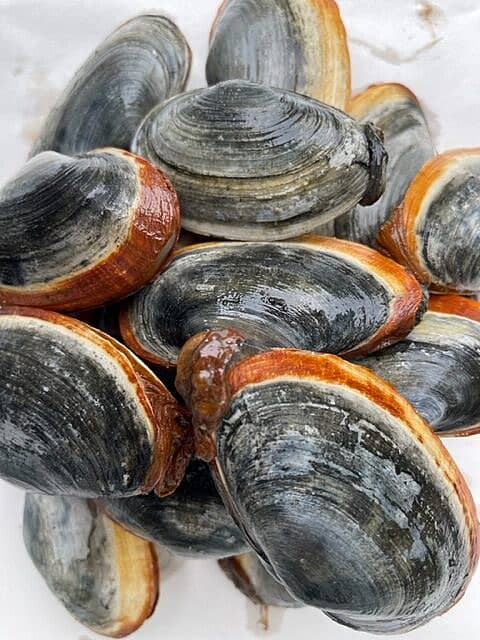Some of my most treasured times, first growing up and then raising a family, have taken place near the ocean in Chatham, Massachusetts on Cape Cod – breathing in the salt air, riding the waves on the Atlantic side of the Cape, walking along the Outer Beach, sailing the waters in Pleasant Bay, or just plopping down on the sand near the water’s edge with a good read. The ocean is one of my dearest friends.
As with many families, dinners at the Cape are one of the day’s main events and often take on a life of their own. We seldom go out; it’s much more fun and relaxing to eat in. Grilling fish for dinner is a given, but catching it isn’t in my family’s DNA . . . the fish we eat comes from a local market. For generations, though, clamming for soft-shell clams (steamers) has been my family’s substitute for consuming something fresh from the sea or, more specifically, the flats that emerge when the tide is low.
I guess you could say that clamming is in my genes. In 1917, the Worcester Telegram and Gazette featured an article about my great-grandfather and his “prodigious clamming gifts”. His son, my grandfather and, subsequently, my father planned their vacation days around the tides so to maximize the daily dig. Dinners were not complete unless there were plenty of steamers to go around before the main course was ready, with bowls of broth drawn from the bottom of the clam pot and cups of melted butter in which to dip each clam before it landed in someone’s mouth. A day without steamers was, and still is, an incomplete day.
The ritual of digging clams is like any other hunting or gathering activity. Preparation is key. The right tools – a rake and a bucket – and knowledge about the daily tides, clam flat locations, and expected abundance help ensure the clammer ends up with a decent harvest. Searching for clam holes requires careful observation. With practice, the clammer can tell which holes will yield a clam (or more) and which will not. And even though the flats will be flooded again when the tide comes back in, the clammer should take care to fill in dug holes and leave the flat as close to the shape s/he found it. Respect for the environment is just as important on a mucky flat as on the open ocean.
In writing this I can’t help but notice the similarities between clamming and the college search and application process. Both ask participants to be patient, mindful, and willing to do one’s homework (education and preparation). Doing the research about either will help ensure a more positive result, whether it’s a more robust clam yield or “best fit” school. An eagerness to “test unknown waters” (forgive the pun!) is also helpful but not necessary.
Both clamming and the college process can be done on one’s own or with others. Done solo, clamming out on the flats offers the chance to think deeply about things without the distractions of our present world. The repetition of looking, digging, looking, and digging can be quite meditative. Similarly, the college process gives adolescents the rare opportunity to think critically about what’s important to them and what’s not, in other words to do some self-reflection without the interference or influence of others around them.
In groups, particularly families, both clamming and the college process offer the chance to bond over a shared endeavor. Clamming can be a fun and engaging family activity; some children love the hunt and others, who would much rather be doing something else, reluctantly agree to dig just to “get it over with.” Similarly, wonderful memories often come from family road trips to visit colleges. Along the way, inputs and perspectives from parents and siblings can be quite helpful when evaluating the pros and cons of each campus.
“It’s a keeper!” is an old expression in clamming and exclaimed when a dug clam is large enough to keep (smaller ones are returned to the dug hole). Likewise, the end goal of the college search and application process is to land on a “keeper,” the “best” place where a student can grow intellectually, personally, and professionally over the next four years. But instead of an empty clam pot after the day’s harvest has been consumed, the college graduate will reap the benefits of that undergraduate experience for years to come.


